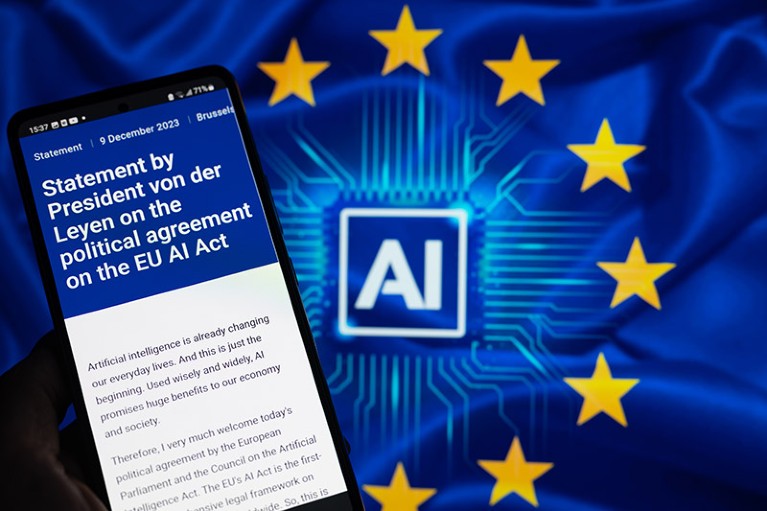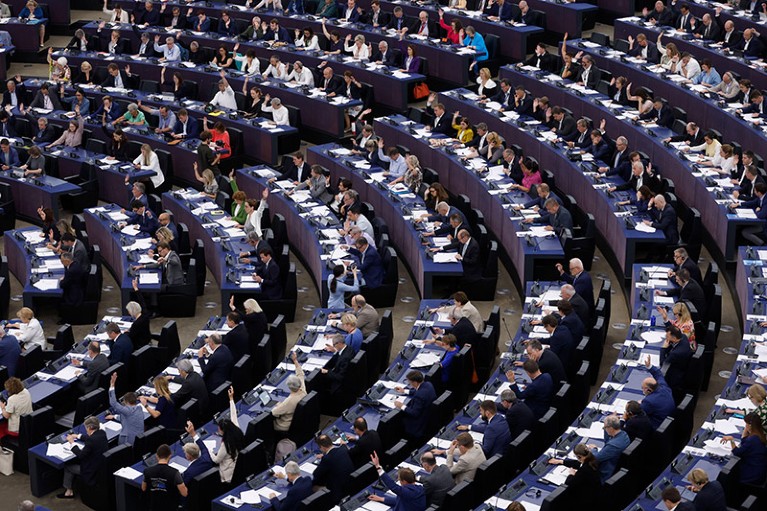
Representatives of EU member governments authorized the EU AI Act this month.Credit score: Jonathan Raa/NurPhoto by way of Getty
European Union international locations are poised to undertake the world’s first complete set of legal guidelines to manage synthetic intelligence (AI). The EU AI Act places its hardest guidelines on the riskiest AI fashions, and is designed to make sure that AI techniques are protected and respect basic rights and EU values.
“The act is enormously consequential, when it comes to shaping how we take into consideration AI regulation and setting a precedent,” says Rishi Bommasani, who researches the societal impression of AI at Stanford College in California.
The laws comes as AI develops apace. This yr is predicted to see the launch of latest variations of generative AI fashions — corresponding to GPT, which powers ChatGPT, developed by OpenAI in San Francisco, California — and current techniques are being utilized in scams and to propagate misinformation. China already makes use of a patchwork of legal guidelines to information industrial use of AI, and US regulation is beneath means. Final October, President Joe Biden signed the nation’s first AI government order, requiring federal businesses to take motion to handle the dangers of AI.
EU nations’ governments authorized the laws on 2 February, and the legislation now wants last sign-off from the European Parliament, one of many EU’s three legislative branches; that is anticipated to occur in April. If the textual content stays unchanged, as coverage watchers count on, the legislation will enter into pressure in 2026.
Some researchers have welcomed the act for its potential to encourage open science, whereas others fear that it might stifle innovation. Nature examines how the legislation will have an effect on analysis.
What’s the EU’s strategy?
The EU has chosen to manage AI fashions on the idea of their potential danger, by making use of stricter guidelines to riskier purposes and outlining separate rules for general-purpose AI fashions, corresponding to GPT, which have broad and unpredictable makes use of.
The legislation bans AI techniques that carry ‘unacceptable danger’, for instance people who use biometric knowledge to deduce delicate traits, corresponding to individuals’s sexual orientation. Excessive-risk purposes, corresponding to utilizing AI in hiring and legislation enforcement, should fulfil sure obligations; for instance, builders should present that their fashions are protected, clear and explainable to customers, and that they adhere to privateness rules anddo not discriminate. For lower-risk AI instruments, builders will nonetheless have to inform customers when they’re interacting with AI-generated content material. The legislation applies to fashions working within the EU and any agency that violates the principles dangers a tremendous of as much as 7% of its annual world income.
“I feel it’s a superb strategy,” says Dirk Hovy, a pc scientist at Bocconi College in Milan, Italy. AI has shortly turn out to be highly effective and ubiquitous, he says. “Placing a framework as much as information its use and improvement makes absolute sense.”
Some don’t assume the legal guidelines go far sufficient, leaving “gaping” exemptions for navy and national-security functions, in addition to loopholes for AI use in legislation enforcement and migration, says Kilian Vieth-Ditlmann, a political scientist at AlgorithmWatch, a Berlin-based non-profit group that research the consequences of automation on society.
How a lot will it have an effect on researchers?
In idea, little or no. Final yr, the European Parliament added a clause to the draft act that may exempt AI fashions developed purely for analysis, improvement or prototyping. The EU has labored onerous to make it possible for the act doesn’t have an effect on analysis negatively, says Joanna Bryson, who research AI and its regulation on the Hertie Faculty in Berlin. “They actually don’t wish to minimize off innovation, so I’d be astounded if that is going to be an issue.”

The European Parliament should give the ultimate inexperienced gentle to the legislation. A vote is predicted in April.Credit score: Jean-Francois Badias/AP by way of Alamy
However the act continues to be more likely to have an impact, by making researchers take into consideration transparency, how they report on their fashions and potential biases, says Hovy. “I feel it’s going to filter down and foster good apply,” he says.
Robert Kaczmarczyk, a doctor on the Technical College of Munich in Germany and co-founder of LAION (Massive-scale Synthetic Intelligence Open Community), a non-profit group aimed toward democratizing machine studying, worries that the legislation might hinder small firms that drive analysis, and which could want to ascertain inside constructions to stick to the legal guidelines. “To adapt as a small firm is actually onerous,” he says.
What does it imply for highly effective fashions corresponding to GPT?
After heated debate, policymakers selected to manage highly effective general-purpose fashions — such because the generative fashions that create pictures, code and video — in their very own two-tier class.
The primary tier covers all general-purpose fashions, besides these used solely in analysis or revealed beneath an open-source licence. These will likely be topic to transparency necessities, together with detailing their coaching methodologies and vitality consumption, and should present they respect copyright legal guidelines .
The second, a lot stricter, tier will cowl general-purpose fashions deemed to have “high-impact capabilities”, which pose a better “systemic danger”. These fashions will likely be topic to “some fairly important obligations”, says Bommasani, together with stringent security testing and cybersecurity checks. Builders will likely be made to launch particulars of their structure and knowledge sources.
For the EU, ‘large’ successfully equals harmful: any mannequin that makes use of greater than 1025 FLOPs (the variety of pc operations) in coaching qualifies as excessive impression. Coaching a mannequin with that quantity of computing energy prices between US$50 million and $100 million — so it’s a excessive bar, says Bommasani. It ought to seize fashions corresponding to GPT-4, OpenAI’s present mannequin, and will embody future iterations of Meta’s open-source rival, LLaMA. Open-source fashions on this tier are topic to regulation, though research-only fashions are exempt.
Some scientists are in opposition to regulating AI fashions, preferring to give attention to how they’re used. “Smarter and extra succesful doesn’t imply extra hurt,” says Jenia Jitsev, an AI researcher on the Jülich Supercomputing Centre in Germany and one other co-founder of LAION. Basing regulation on any measure of functionality has no scientific foundation, provides Jitsev. They use the analogy of defining as harmful all chemistry that makes use of a sure variety of person-hours. “It’s as unproductive as this.”
Will the act bolster open-source AI?
EU policymakers and open-source advocates hope so. The act incentivizes making AI info accessible, replicable and clear, which is nearly like “studying off the manifesto of the open-source motion”, says Hovy. Some fashions are extra open than others, and it stays unclear how the language of the act will likely be interpreted, says Bommasani. However he thinks legislators intend general-purpose fashions, corresponding to LLaMA-2 and people from start-up Mistral AI in Paris, to be exempt.
The EU’s strategy of encouraging open-source AI is notably completely different from the US technique, says Bommasani. “The EU’s line of reasoning is that open supply goes to be important to getting the EU to compete with the US and China.”
How it’s the act going to be enforced?
The European Fee will create an AI Workplace to supervise general-purpose fashions, suggested by unbiased specialists. The workplace will develop methods to guage the capabilities of those fashions and monitor associated dangers. However even when firms corresponding to OpenAI adjust to rules and submit, for instance, their huge knowledge units, Jitsev questions whether or not a public physique could have the sources to scrutinize submissions adequately. “The demand to be clear is essential,” they are saying. “However there was little thought spent on how these procedures must be executed.”

